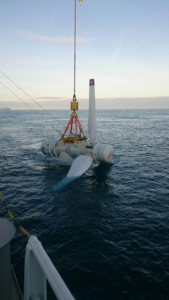 Waste-to-energy innovator SIMEC Atlantis’s link up with Japanese partners has yielded dividends, with tests of its current-harnessing technology off a Japanese island.
Waste-to-energy innovator SIMEC Atlantis’s link up with Japanese partners has yielded dividends, with tests of its current-harnessing technology off a Japanese island.
Trials of the power engineers’ Scottish-built AR500 tidal turbine off Naru, in Japan’s far west, have met the approval of the country’s ministry of economy, trade and industry (METI), a key gatekeeper to consenting renewable energy projects.
SIMEC Atlantis says the four month trial is the first large scale project of its kind in Japanese waters. It shows the tidal industry can make a meaningful contribution in Japan’s ambition to diversifying its energy supply into renewables, CEO Graham Reid told investors.
Teams in both countries have worked with client Kyuden Mirai Energy (KME) to demonstrate to Japanese officials that the equipment meets regulatory standards. Tests included:
- Delivering the turbine’s stated performance during peak tidal flows
- Demonstrating safe system shutdown during the year’s peak flow rates
- Riding out temporary loss of auxiliary power from shore, and safe shutdown during an extended outage
- Rapid shutdown in response to an emergency trigger from shore
Installed in January 2021, the AR500 tidal turbine has generated more than 90MWh of power. It has done so under restrictions dictated by METI’s verification protocols. Far greater potential exists, the firm, believes, with Japan’s deep and fast moving tidal currents lending themselves to arrays of megawatt-sized commercial turbines.
“I am extremely proud of the entire team”, Reid declared to investors. “We are all delighted to have achieved this accreditation from METI. It confirms the capability and reliability of our technology and is a huge step forward in paving the way to the next phase of this exciting project and other future projects in Japan.”
Meanwhile, SIMEC Atlantic informed investors of its response to national planning body the Planning Inspectorate ‘calling in’ local planners’ approval for its conversion to waste pellet-burning of the Uskmouth coal power station in south Wales.
In its ‘statement of case’ the company points out that there is no direct link between the operation of Uskmouth Power Station and the management of mixed municipal and residual wastes. No statutory consultee had objected when consulted earlier in the planning application, it states.
The two announcements excited investors. By 16:30 on the day of the announcement (24-05-21), SIMEC Atlantis’ share price had surged 33% higher, at 8.20 pence.



